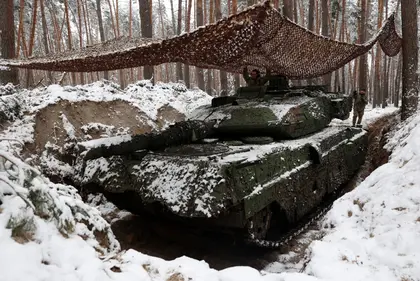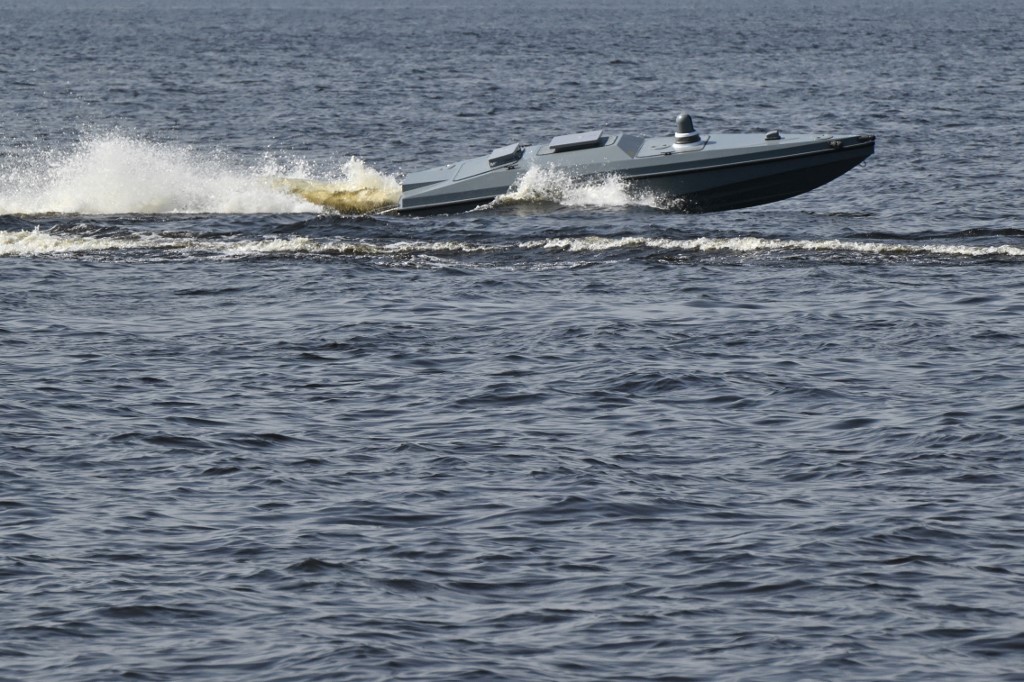In a snow-blanketed forest near the front line in eastern Ukraine, a 59-tonne battle tank rumbled from a camouflaged dug-out, where Ukrainian forces are holding back Russian attacks.
Kyiv lobbied for months this year to get sophisticated Leopard tanks from Germany and other Western allies to push back Russian forces.
JOIN US ON TELEGRAM
Follow our coverage of the war on the @Kyivpost_official.
But since Ukraine’s highly anticipated offensive petered out this summer, the mammoth tanks have instead being deployed to hold the line.
A deputy of a company in the 21st mechanised brigade told AFP the Strv 122 tank -- the Swedish version of the Leopard 2A5 -- was now being used to hit infantry groups or ammunition depots.
“In other words, it’s not being used in the same way as during the counter-offensive,” said 25-year-old Ruslan, referring to Ukraine’s push this summer to gain ground in the south.
The front line in Ukraine -- including in the Kharkiv region, where the Strv 122 was deployed -- has been largely static for the past year.
But since September, Moscow’s troops have been pushing steadily for Kupiansk, a war-battered town, once home to 30,000 people, in the Kharkiv region bordering Russia.
Kyiv had hoped the Leopards would penetrate Russian defences and then rumble south towards Crimea -- the peninsula unilaterally annexed by the Kremlin in 2014.
- Defence an ‘important focus’ -
Instead, they are positioned along the front, acting more like long-range artillery than offensive battle tanks moving deeper into Russian-held territories.

Young Woman in Kyiv Region Succumbs to Injuries From Russian Drone Attack
The German tabloid Bild recently ran an article entitled “It wasn’t really planned this way”, describing how Kyiv was utilising the Leopards.
“Leopard 2A6 tanks delivered by Germany are being used to prevent the east of the country from falling further under Russian control,” it said, rather than taking back the south.
The tanks’ deployment follows a trend in Ukraine, where political and military officials are emphasising the need to entrench to block Russian advances.
“The construction of fortifications is an important focus for us,” Defence Minister Rustem Umerov said on social media this week.
After stalling, Germany and other European countries decided early this year to supply Kyiv with around 70 Leopards for the highly anticipated counter-offensive.
The deliveries bolstered Ukraine’s ranks of ageing Soviet-era armour and Kyiv formed new units -- like the 21st -- for the attack.
“An army can break through enemy lines and put an end to a long period of trench warfare,” Armin Papperger -- CEO of Rheinmetall, which supplies the tank’s cannon -- said this January.
“With the Leopard, soldiers can advance dozens of kilometres at a time.”
- ‘You need more’ -
Ukrainian troops recaptured several villages in the south but there was no major breakthrough past heavily entrenched Russian positions.
Ukrainian media reported that Kyiv lost around 12 Leopards in the stalled offensive.
Leopards are “very effective but to carry out large-scale offensives, you need more”, Ruslan told AFP in the Kharkiv region.
He said Ukrainian forces would have needed as many as 150 to make progress. He nonetheless praised the weapon, hailed for its firepower, mobility and armour.
Near Lyman, Leopards mostly work in pairs, firing some 15 rounds each at any given Russian position.
“It’s more efficient,” explained company commander Anton, adding that sometimes the tanks were deployed twice in a day, or twice in a week.
“The front has calmed down a little. Winter is coming. We won’t be advancing in force,” he said.
Leopards have also been deployed to hold Russian forces back from Avdiivka, an industrial town in the Donetsk region that the Kremlin has been trying to capture for nearly two months.
Anton, who like Ruslan declined to give his last name for security reasons, said he would like to go back on the offensive.
A “tank against tank” battle, he explained, would allow his crew to exploit the Leopard’s qualities to their fullest.
“We’re now in a defensive position. But we need to plan how to go further and reclaim our territory,” he said.
You can also highlight the text and press Ctrl + Enter






